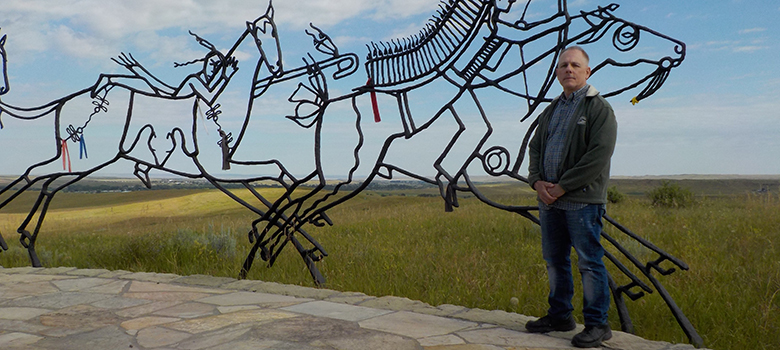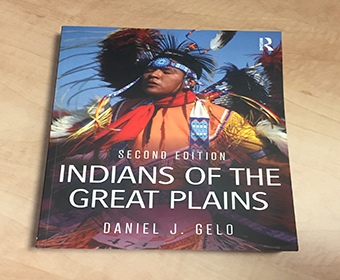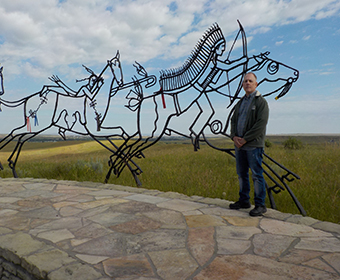
(Oct. 25, 2018) -- Daniel J. Gelo, is a professor, Stumberg Distinguished University Chair, and dean of the College of Liberal and Fine Arts (COLFA) at UTSA.
As a cultural anthropologist, Gelo studies the way humans express their thoughts, feelings and values through various cultural activities including ritual, myth, social organization, music, dance, dress and language.
Since the 1980s, Gelo has conducted ethnographic fieldwork and archival research with the Comanches, a Plains Indian society living in southwest Oklahoma.
A new, second edition of Gelo’s textbook Indians of the Great Plains provides a thorough study of Plains Indian life.

We recently asked Dean Gelo about his research.
Tell us about the new edition of your textbook.
This new edition has a lot of changes to make the text livelier—more readable and memorable. The writing is more straightforward, vocabulary terms are highlighted and there are text boxes exploring case studies. There are several new maps, tables and historical photos, and the statistics on the tribes have been updated.
What impact do you hope your research has?
Generally, I hope that it promotes a full appreciation of Comanche culture, beyond the sensational portrayals that are available, and that it helps the Comanches themselves perpetuate their unique lifeways. As for the textbook, I hope it’s accepted as the general knowledge base for college students and all readers interested in Plains Indian people.

What is something interesting that is going on in your field of research that not many people know about?
Some of my research has to do with how the Comanches used the landscape in Texas for hunting, camping, trading and religious ceremonies. We’re still learning a lot about their sense of place, their trails and the signs they used for navigating. Chris Wickham, UTSA German professor emeritus, and I recently published some details, about the Comanches, recorded by a German settler near Fredericksburg around 1850.
What advice would you share with students who are interested in studying anthropology or entering your field?
Study with many different professors and be open to learning about all aspects of culture, including language. There are all kinds of great career opportunities for those with experience understanding other cultures. When seeking that experience through fieldwork, it is important to be respectful, quiet and, above all, patient.
What makes COLFA unique?
COLFA is distinctive because it has the largest number of majors but it also serves virtually every UTSA student. Lots of students find their home in COLFA because it offers traditional arts, humanities and social science subjects along with innovative new programs like public health, global affairs, politics and law, museum studies and medical humanities.
Learn more about Daniel Gelo.
Learn more about the UTSA College of Liberal and Fine Arts.
Connect with UTSA online at Facebook, Twitter, YouTube, Instagram and LinkedIn.
UTSA Today is produced by University Communications and Marketing, the official news source of The University of Texas at San Antonio. Send your feedback to news@utsa.edu. Keep up-to-date on UTSA news by visiting UTSA Today. Connect with UTSA online at Facebook, Twitter, Youtube and Instagram.
Move-in Day is an exciting time for incoming students. Students living in Chaparral Village move in from August 20-21. The UTSA Housing and Residence Life (HRL) team looks forward to welcoming you all and helping you settle into your room.
Chaparral VillageMove-in Day is an exciting time for incoming students. Students living in Laurel Village move in on August 22. The UTSA Housing and Residence Life (HRL) team looks forward to welcoming you all and helping you settle into your room.
Laurel VillageThe College of Sciences welcomes our newest Roadrunners to UTSA at VIVA Science! This interactive event connects students with faculty, staff, student leaders, and peers while highlighting the opportunities available across the College.
Outdoor Learning Environment 2 (OLE), Flawn Building, Main CampusWe're excited to welcome the new class of UTSA College of Liberal and Fine Arts (COLFA) students to campus! Move In To COLFA is strongly recommended for new students in COLFA because it gives you the chance to learn about the Student Success Center, learn how to do college successfully and meet new friends.
Galleria (MH 2.01), McKinney Humanities Building, Main CampusBuild connections with your Alvarez College of Business peers and learn more about the Career Compass program! This opportunity will provide fun interactions, giveaways and a chance to meet your next friend!
Richard Liu Auditorium (BB 2.01.02,) Business Building, Main CampusCelebrate the end of summer and the start off a great fall semester with The Housing Block Party! This event will have live music, carnival-style treats, artists, games, and activities galore. Come and join us for a night of fun!
Multipurpose Room/Lawn, Guadalupe Hall, Main CampusBe part of an unforgettable night as SOSA takes the field for its first public performance of the season! Experience the power, pride, and pageantry of UTSA’s marching band. Learn beloved traditions, practice cheers, and feel what it means to be a Roadrunner.
Campus Rec FieldsThe University of Texas at San Antonio is dedicated to the advancement of knowledge through research and discovery, teaching and learning, community engagement and public service. As an institution of access and excellence, UTSA embraces multicultural traditions and serves as a center for intellectual and creative resources as well as a catalyst for socioeconomic development and the commercialization of intellectual property - for Texas, the nation and the world.
To be a premier public research university, providing access to educational excellence and preparing citizen leaders for the global environment.
We encourage an environment of dialogue and discovery, where integrity, excellence, respect, collaboration and innovation are fostered.